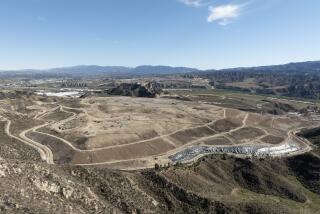Glendale OKs Plan to Fix Gas Leak in Scholl Canyon
- Share via
The Glendale City Council has earmarked $845,000 to replace a faulty gas-collection system under what was once a portion of the Scholl Canyon landfill, where potentially dangerous emissions of methane gas were discovered in September.
The council voted unanimously to accept a $709,166 bid from Valley Crest Landscape to dig up and remove the gas-collection pipes and burning equipment at the site. A golf course and tennis complex built on the former section of the dump have been closed since the emissions were detected.
The council approved an additional $135,824 to hire an on-site contractor to supervise construction and operation of the new system, and for a contingency fund to cover unforeseen expenses.
The money is part of the $2.5 million to $5 million the city estimates that it must spend to make the site safe.
“We don’t have the technical expertise for this type of project, and we can’t staff the unusual,” said George Miller, the city’s public works director.
City officials ordered the golf course closed Sept. 29 after tests determined that gas was leaking.
The city immediately ordered a study by Mandeville & Associates, a firm specializing in control of landfill emissions.
The company recommended that the city install new collection lines and gas wells.
The study was completed in May, and in June the city called for bids for the new gas-collection system. “We have moved on this entire process as fast as possible,” Miller said.
The city must also cap the site with at least four feet of dirt, officials said. “We’re applying state-of-the-art technology,” Councilman Carl Raggio said.
Miller said the new system will be installed by the end of December, and the cap could be completed by February or March.
The Parks and Recreation Department will then landscape a new golf course over the dirt cap, he said.
A gas-collection system was installed in Scholl Canyon in 1983 for $350,000.
The system’s pipes, however, could not resist the refuse compaction and broke, Miller said.
“It wasn’t anybody’s fault,” he said. “That type of problem is not uncommon in landfills, but with the new materials and technologies we’re applying, it shouldn’t happen again. The industry has learned an awful lot.”
More to Read
Sign up for Essential California
The most important California stories and recommendations in your inbox every morning.
You may occasionally receive promotional content from the Los Angeles Times.













